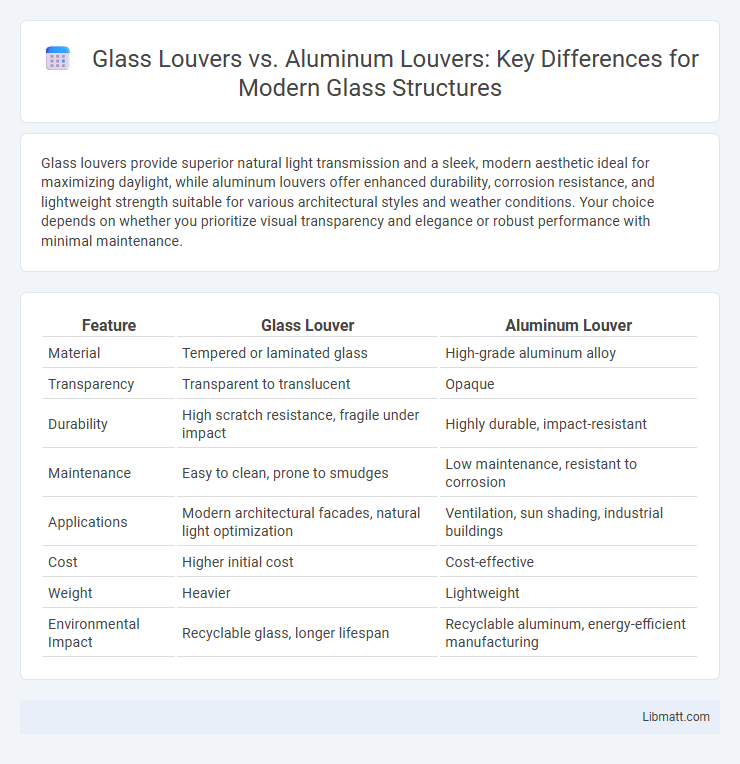Glass louvers provide superior natural light transmission and a sleek, modern aesthetic ideal for maximizing daylight, while aluminum louvers offer enhanced durability, corrosion resistance, and lightweight strength suitable for various architectural styles and weather conditions. Your choice depends on whether you prioritize visual transparency and elegance or robust performance with minimal maintenance.
Table of Comparison
| Feature | Glass Louver | Aluminum Louver |
|---|---|---|
| Material | Tempered or laminated glass | High-grade aluminum alloy |
| Transparency | Transparent to translucent | Opaque |
| Durability | High scratch resistance, fragile under impact | Highly durable, impact-resistant |
| Maintenance | Easy to clean, prone to smudges | Low maintenance, resistant to corrosion |
| Applications | Modern architectural facades, natural light optimization | Ventilation, sun shading, industrial buildings |
| Cost | Higher initial cost | Cost-effective |
| Weight | Heavier | Lightweight |
| Environmental Impact | Recyclable glass, longer lifespan | Recyclable aluminum, energy-efficient manufacturing |
Introduction to Glass Louvers and Aluminum Louvers
Glass louvers offer a sleek, modern aesthetic with high transparency, allowing maximum natural light while providing weather protection and ventilation. Aluminum louvers are known for their durability, corrosion resistance, and lightweight properties, making them ideal for industrial and architectural applications where strength and low maintenance are essential. Both materials serve functional roles in controlling airflow and light, but glass louvers emphasize visual appeal and daylighting, whereas aluminum louvers prioritize robustness and longevity.
Material Properties: Glass vs Aluminum Louvers
Glass louvers offer superior translucency and aesthetic appeal, providing natural light diffusion while maintaining weather resistance and thermal insulation. Aluminum louvers excel in durability, corrosion resistance, and lightweight strength, making them ideal for high-impact and industrial applications. Both materials present distinct advantages depending on design priorities, with glass focusing on visual openness and aluminum emphasizing structural resilience.
Aesthetic Appeal: Design Versatility and Style
Glass louvers offer a sleek, modern aesthetic with high transparency and light diffusion, enhancing natural illumination while providing a clean, minimalist look ideal for contemporary designs. Aluminum louvers provide greater design versatility through customizable finishes, colors, and shapes, allowing architects to achieve various styles from industrial to classic while ensuring durability and low maintenance. Your choice depends on whether you prioritize the elegant, light-enhancing qualities of glass or the robust, highly adaptable design options of aluminum.
Durability and Maintenance Requirements
Glass louvers provide high durability with excellent resistance to weathering, corrosion, and UV damage, making them ideal for long-term use in various environments. Maintenance involves regular cleaning to prevent dirt and grime buildup, but glass is less prone to physical damage compared to aluminum, which can dent or corrode over time, especially in coastal or industrial areas. Aluminum louvers require periodic repainting or anodizing to maintain their appearance and prevent oxidation, increasing maintenance efforts and costs relative to glass options.
Energy Efficiency and Thermal Performance
Glass louvers offer superior natural light transmission, reducing the need for artificial lighting and enhancing energy efficiency in buildings. Aluminum louvers provide excellent thermal insulation due to their reflective properties, effectively minimizing heat gain and loss. Combining glass louvers with energy-efficient coatings and aluminum frames can optimize thermal performance and overall energy savings.
Light Control and Ventilation Capabilities
Glass louvers provide superior light control by allowing adjustable transparency and diffusing natural daylight, enhancing indoor brightness without glare. Aluminum louvers excel in ventilation capabilities due to their durability and ability to be angled precisely for optimal airflow, making them ideal for maintaining air circulation. Combining glass's light modulation with aluminum's ventilation efficiency offers a balanced solution for environments requiring both natural illumination and effective airflow management.
Cost Comparison: Initial and Long-term Expenses
Glass louvers typically have a higher initial cost due to material and installation expenses, but they offer superior durability and low maintenance, potentially reducing long-term costs. Aluminum louvers are generally more affordable upfront and easier to install, yet they may require more frequent maintenance or replacement over time. Your choice depends on balancing upfront investment with expected longevity and upkeep budgets.
Installation Process and Structural Considerations
Glass louvers require a more precise installation process involving careful alignment and sealing to prevent water leakage and ensure thermal insulation, often necessitating specialized mounting hardware due to the brittle nature of glass. Aluminum louvers are typically easier to install with standard framing systems, offering greater flexibility and lightweight properties that reduce structural load on buildings. Structural considerations favor aluminum louvers in terms of durability and resistance to corrosion, while glass louvers demand stronger support systems to handle their weight and fragility.
Safety and Security Aspects
Glass louvers provide limited impact resistance compared to aluminum louvers, which are known for their durability and strength under force. Aluminum louvers enhance safety by offering superior protection against break-ins and harsh weather conditions due to their robust construction. Glass louvers may require tempered or laminated glass to improve security, but aluminum remains the preferred choice for high-security applications.
Choosing the Right Louver: Factors to Consider
When choosing the right louver, consider durability, maintenance, and aesthetic appeal between glass louver and aluminum louver options. Glass louvers offer superior natural light transmission and modern elegance, while aluminum louvers excel in lightweight strength, corrosion resistance, and lower maintenance costs. Your choice depends on balancing transparency needs, weather exposure, and long-term performance requirements.
Glass louver vs aluminum louver Infographic

 libmatt.com
libmatt.com